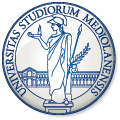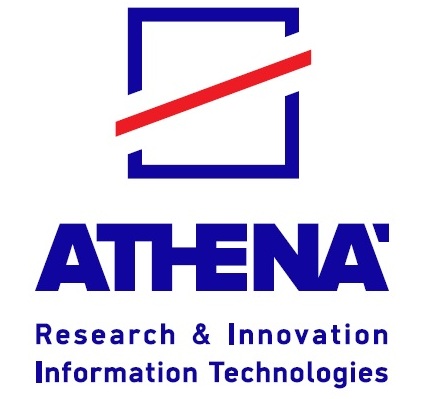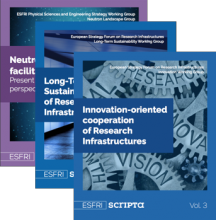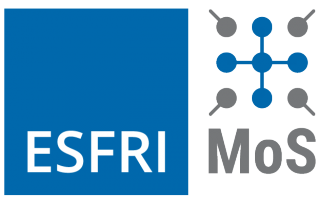Partners

StR-ESFRI3 Partners
The StR-ESFRI2 Project is led by the Athena Research Center (Greece) and the project members include experienced entities from Italy, Slovenia and the Czech Republic with strong involvement in ESFRI and its activities.
The scope of activities of Athena RC includes all Information and Communication Technologies, from the perspective of both Computer Science and Computational Sciences, and covering all software and hardware aspects. These include all areas of informatics, data science, robotics, automation, signal processing, artificial intelligence, networking and digital communication, and modelling. Athena RC carries out R&D both at the level of information technology itself and the level of specific applications. Computational sciences thus form a strong component of the Athena RC activities, including - but not limited to - computational linguistics, archaeology, engineering, medicine, biology, biodiversity, earth observation, space science, mechanics, and the arts. Athena RC is recognized for its extensive experience and unique skills offered through its more than 300 researchers, associated faculty, collaborating scientists, and professional staff. By participating in more than 200 national and European projects in the last 5 years and producing more than 1000 publications in the same time frame, the people of Athena RC may be credited with its strong international reputation.
Athena RC operates in three Greek cities (Athens, Patras, and Xanthi) and comprises three Institutes and five Units:
- Institutes: The Institute for Language and Speech Processing (ILSP), The Industrial Systems Institute (ISI), and The Information Management Systems Institute (IMSI)
- Units: the Corallia Technology Cluster Initiative, the Space Programmes Unit (SPU), the Robot Perception and Interaction Unit (RPI), the Environmental and Networking Technologies and Applications Unit (ENTA), and the PharmaInformatics Unit.
 Università degli Studi di Milano, UMIL
Università degli Studi di Milano, UMIL
The University of Milan is a public teaching and research-intensive university, the only Italian among the 23 members of LERU (League of European Research Universities), and an internationally high-ranked university. Research activities are conducted in 32 Departments and 22 Inter-departmental Research Centres, with more than 24.000 scientific publications in the last three years, 222 patent family and 24 active spin-offs.
The University’s researchers occupy leading positions in numerous research programmes conducted both at a national and international level. U programmes represent a major source of funding for the University of Milan, which has signed 147 grants under the 7th Framework Programme (2007-2013), for a total value of € 50.344.153, and 70 grants up to December 2017 under the Horizon 2020 Programme, for a total value of more than € 19.000.000. The Department of Physics hosts research activities in various domains of fundamental and applied Physics. The Department employs 49 professors, 34 researchers and 32 administrative and technical staff units. Several Italian and foreign students of the PhD School and Post-Docs contribute to the research activities of the Department.
University of Ljubljana (UL) is the oldest, largest, and internationally best-ranked university in Slovenia, being among the top 500 universities according to the Academic Ranking of World Universities Shanghai ranking (ARWU). Researchers from the Faculty of Social Sciences (FSS) will participate in the project. FSS is one of the largest members of the University of Ljubljana. It provides educational and research activities across a broad range of fields, including sociology, political sciences, communications, cultural sciences, international relations, European studies, and many other disciplines. FSS has its own research unit – the Institute of Social Sciences (ISS). ISS is composed of 20 active research centres and Social Sciences Data Archives that conduct basic and applied research in social sciences. UL is thus bringing together the necessary disciplinary and inter-disciplinary knowledge, with emphasis on social sciences and humanities.
FYZIKALNI CHEMIE J. HEYROVSKEHO AV CR, v. v. i., Czech Academy of Sciences, HIPC
The Institute is a centre of fundamental research in physical chemistry, and chemical physics. The research work is characterized by many cross-links both within the Institute and also with other institutions in Europe, the USA, Japan and other parts of the world. Much of the scientific work is concerned with fundamental research, in both experiment and theory, but several groups, in particular in catalysis and electrochemistry, are also making contributions in more applied aspects. The institute comprises laboratories with complete infrastructure for catalysis, electrochemistry, ion chemistry and analytical research. The Institute is operating the national research infrastructure NanoEnviCZ and serving as platform for the Center for innovation in the field of Nanomaterials and Nanotechnologies. In top of these facilities HIPC is running several computational clusters (c. 34.000 cores), which are fully equipped for large scale quantum chemical calculations. A staffed library, full IT infrastructure, new modern conference centre and a project support office are available at HPC and are complementing the research facilities. Besides the research activities the Institute is strongly involved in training of both undergraduate and graduate students, supervising their diploma and Ph.D. theses, and in teaching at universities in Czech Republic and abroad.
HIPC is active in EU funded research Framework programs. It is running several FP7 and H2020 projects (including the prestigious ERA-Chair project), it has participated in several ITN projects (some coordinated) and other MSC actions, and it took part also in COST, Euratom projects. The present institute staff consists of about 165 full-time employees and approximately 45 graduate students.





